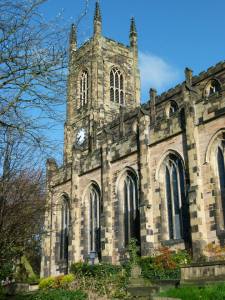Agents of change transformation and reconciliation
Holy Trinity Church, Huddersfield, Sunday 27th October 2019

“Ponder anew.” Two words from a hymn at the beginning of the service. Ponder anew what the Almighty can do, or in other words, keep on thinking about what God has done and what he can do. This is what struck me most about the service yesterday. Which is strange, because it had nothing to do with the rest of the day’s service.
I was glad of the extra hour in bed due to the clocks going back last night. It is no longer British Summertime, British Summer herself had departed weeks ago.
The sermon was about God and Politics, and was delivered without mention of Brexit. It started with a question which I took to be rhetorical: Should Christians be involved in politics? Some in the congregation answered by saying, “Yes.”
Jesus was always being involved politically. Was the preacher’s reply to his own question, but he did mention that there is such a thing as reader response. People can have different responses to the same political speech, debate or even sermon.
The protagonists in the Bible reading from Matthew chapter 22 were the Pharisees who were not only religious but political leaders. They were so keen to trap Jesus that they joined together with the Herodians. The Pharisees were proud of their Jewish heritage, the Herodians although also Jewish, sympathised with the occupying Romans. The question was a subtle one, ‘Is it right to pay taxes to the Caesar? Got him both ways. If Jesus said yes, the Pharisees would denounce him for disobeying God’s laws if no was the answer then the Herodians would tell Herod that Jesus was practising sedition. The penalty for sedition was death. The coin tat the tax had to be paid in had on it the head of the Emporer and the inscription Augustus Tiberius son of the god Augustus. A claim to be the son of a god. The other side said, High Priest. You could see why the Jews would have disliked it. Some refused to touch the money.
Jesus’ answer has been interpreted in several ways over the years. The first is simply Pay the tax. Another is that it was a coded message saying don’t pay.
What Jesus was saying was give to God what is rightly his. There are other times when Jesus criticised the Pharisees for their adherence to the tiny details of the law. He said that they would tithe dill, mint and cumin while ignoring the more important parts of the law, justice and mercy and faithfulness. Jesus likened this to straining out gnats and swallowing camels.
But let justice roll on like a river, righteousness like a never-failing stream says Amos 5:24, Justice and mercy are God’s agenda.
I cannot remember if what follows was explicit or implicit in the sermon, but we were reminded at the end of the service that we are agents of change, transformation and reconciliation.
